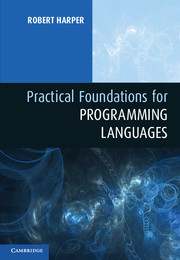Book contents
- Frontmatter
- Contents
- Preface
- Part I Judgments and Rules
- Part II Statics and Dynamics
- Part III Function Types
- Part IV Finite Data Types
- Part V Infinite Data Types
- Part VI Dynamic Types
- Part VII Variable Types
- Part VIII Subtyping
- Part IX Classes and Methods
- Part X Exceptions and Continuations
- Part XI Types and Propositions
- Part XII Symbols
- Part XIII State
- Part XIV Laziness
- Part XV Parallelism
- 39 Nested Parallelism
- 40 Futures and Speculations
- Part XVI Concurrency
- Part XVII Modularity
- Part XVIII Equational Reasoning
- Part XIX Appendix
- Bibliography
- Index
40 - Futures and Speculations
from Part XV - Parallelism
Published online by Cambridge University Press: 05 February 2013
- Frontmatter
- Contents
- Preface
- Part I Judgments and Rules
- Part II Statics and Dynamics
- Part III Function Types
- Part IV Finite Data Types
- Part V Infinite Data Types
- Part VI Dynamic Types
- Part VII Variable Types
- Part VIII Subtyping
- Part IX Classes and Methods
- Part X Exceptions and Continuations
- Part XI Types and Propositions
- Part XII Symbols
- Part XIII State
- Part XIV Laziness
- Part XV Parallelism
- 39 Nested Parallelism
- 40 Futures and Speculations
- Part XVI Concurrency
- Part XVII Modularity
- Part XVIII Equational Reasoning
- Part XIX Appendix
- Bibliography
- Index
Summary
A future is a computation whose evaluation is initiated in advance of any demand for its value. Like a suspension, a future represents a value that is to be determined later. Unlike a suspension, a future is always evaluated, regardless of whether its value is actually required. In a sequential setting futures are of little interest; a future of type τ is just an expression of type τ. In a parallel setting, however, futures are of interest because they provide a means of initiating a parallel computation whose result is not needed until (presumably) much later, by which time it will have been completed.
The prototypical example of the use of futures is to implementing pipelining, a method for overlapping the stages of a multistage computation to the fullest extent possible. This minimizes the latency caused by one stage waiting for the completion of a previous stage by allowing the two stages to proceed in parallel until such time as an explicit dependency is encountered. Ideally, the computation of the result of an earlier stage is completed by the time a later stage requires it. At worst the later stage must be delayed until the earlier stage completes, incurring what is known as a pipeline stall.
A speculation is a delayed computation whose result may or may not be needed for the overall computation to finish. The dynamics for speculations executes suspended computations in parallel with the main thread of computation, without regard to whether the value of the speculation is actually required by the main thread.
- Type
- Chapter
- Information
- Practical Foundations for Programming Languages , pp. 337 - 344Publisher: Cambridge University PressPrint publication year: 2012

